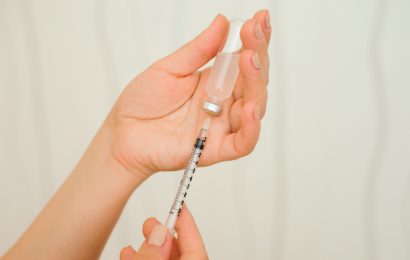After-meal blood sugar spikes can be a significant issue for people who have diabetes, but new research from the University of Missouri suggests that increasing protein consumption at breakfast can help prevent these spikes in those with Type 2 diabetes. Roughly 29 million people in the United States are living with Type 2.
Earlier research has shown that the blood sugar response after one meal is affected by what was eaten in the previous meal, an occurrence known as the “second-meal phenomenon.” To determine the impact of a high-protein versus a high-carbohydrate breakfast on the blood sugar response after both breakfast and lunch in people with Type 2 diabetes, investigators recruited 12 men and women with the condition. For seven days, the participants ate either a 500-calorie breakfast meal consisting of 35% protein and 45% carbohydrate, or a 500-calorie breakfast meal consisting of 15% protein and 65% carbohydrate. On the seventh day, the breakfast meal was followed by a standard 500-calorie lunch 4 hours later, and blood samples were taken throughout the day to assess the subjects’ levels of glucose, insulin, and several gut hormones that help regulate the insulin response.
The researchers found that the high-protein breakfast lowered blood glucose levels after both breakfast and lunch and that insulin levels were slightly elevated after lunch, indicating that the participants’ bodies were working properly to manage blood sugar.
Although increasing protein intake at breakfast is helpful for managing after-meal blood glucose, the researchers note that it is not necessary to consume excessive amounts of the nutrient. They recommend eating 25 to 30 grams of protein at breakfast, which is within the Food and Drug Administration’s recommended range of 50 grams of protein daily for those on a 2,000-calorie diet.
“If people skip breakfast, their glucose response at lunch will be huge. In our study, we found those who ate breakfast experienced appropriate glucose responses after lunch,” noted study author Jill Kanaley, PhD. “Eating breakfast prompts cells to increase concentrations of insulin at the second meal, which is good because it shows that the body is acting appropriately by trying to regulate glucose levels.”
Kanaley adds that consistent monitoring of blood sugar levels is critical for people with Type 2 diabetes to determine how different foods eaten under different circumstances will affect their blood sugar levels.
For more information, read the article “Prevent type 2 diabetes blood-sugar spikes by eating more protein for breakfast, experts say” or see the study’s abstract in The Journal of Nutrition. And for more information on preventing after-meal spikes, read “Strike the Spike II,” by 2014 Diabetes Educator of the Year Gary Scheiner.
Researchers are evaluating whether certain medicines can help people newly diagnosed with Type 1 diabetes to make some of their own insulin. Bookmark DiabetesSelfManagement.com and tune in tomorrow to find out how to enroll in their study.





